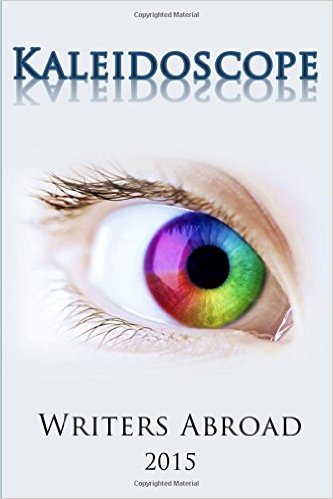
This story was first published in the Writers Abroad 2015 anthology ‘Kaleidoscope’. All proceeds go to the charity Room To Read.
Available now via Amazon or via Lulu
‘Struck’
Charlie Burgess doesn’t remember the lightning strike. But if people ask him about it, what he tells them is this.
He tells them about the flash.
“A really bright light. And so white. Blinding white. Everything glowed.”
He says that last part in an awe-struck whisper.
What I just told you, he seems to suggest, is something special, something spiritual. That white light, flashing down from above, is symbolic of something.
And he supposes it is God, though he never says it out loud.
Instead, he tells them about the force of it.
“Like being smashed in the chest by a rhino. A great big thump. I felt it shudder in my heart.”
And he always pauses then to give the listener a moment.
They are imagining a rhino’s charge, the rumbling sound of hooves on the ground, the terrifying moment before impact. They are thinking of all that muscle, the sheer visceral power of it. They are thinking “Yes, I can imagine how that must feel.”
And he smiles then and says “It left a terrible scar.”
No-one ever asks if they can see it but their eyes always widen with anticipation.
And when he lifts his shirt to reveal the purple, reddish welt they always wince.
Perhaps until that moment they have had their doubts. Assumed he could very well be spinning them a yarn. Because it’s not that often they encounter someone like him.
He doesn’t blame them for doubting. For a long time he had doubted it himself.
“You were struck” they told him when he came round.
This was days later, days when he had apparently existed without knowing it.
He remembers thinking “How am I still alive?”
He never tells anyone about this, how it feels to be a walking miracle.
This is how it feels.
It doesn’t feel miraculous. Instead, there is a hole. That is the only way he can describe it. He has tried many times, over the years, to get beyond this description, to flesh it out and make more sense of it, but nothing comes. The hole is all there is.
He remembers nothing about the strike. All he knows is what people tell him.
A storm rolled in and before the rain fell he was hit. People saw it. They saw him as he was thrown back, heard the dull thud as he hit the ground, called for help as he lay limp and lifeless in the grass. No heartbeat, nothing. For all intents and purposes he was gone.
But sometimes he catches a glimpse of it. A hazy sense of that day – too vague to be called a memory.
There is the field, the grass summer high and swaying in the breeze. There are the meadow flowers, yellow, purple and red. There is the hum of insects and bees and birdsong.
The sun is shining. He remembers that – he is sure of it. A clear blue sky. No leaden clouds, no charge in the air to set the hair of his arms on end. No, there was no warning, no sense of what was to come.
And then there is nothing, just the hole and the days when he didn’t exist.
They are still with him now, those lost days. Persisting in small moments of forgetfulness, like the newspaper he must read three times over if he is to stand a chance of making sense of it. Like the lost keys and the gas rings left burning.
He jokes about it, tries to pretend it’s not so bad.
“I wrap my own Christmas presents” he laughs “When I open them it’s always a surprise.”
And people laugh because it’s funny. People laugh because they think there’s nothing wrong.
He has to show them the scar to remind them.
“The lightning did this to me.”
But he doesn’t he tell them the truth about the scar. How he really got it.
Lightning rarely leaves a mark. All that energy, all that power, yet it leaves no trace.
On the surface at least.
But inside, hidden within muscle, nerves and cells, that is where the damage exists, unseen, readily dismissed and easily forgotten.
He understood very quickly that people needed to see the damage to believe it. Their sympathy came only when they could see what was broken.
So he zigzagged the scar across his chest. A red sear of energy and desperation right there upon his skin which could leave no-one in any doubt.
“This is what happened to me. See? See where it struck?”
And he knows the man he was would have been horrified by such a thing.
Charlie Burgess, the one who existed before all of this, was not a man for inflicting pain. Nor was he a man who believed in luck – good, or bad. He did not believe in fate. If he believed in anything it was probability, the chance that certain things can happen, and that, for some people, they actually do.
Charlie Burgess never looked to the heavens for fear of what may strike from above. Nor did he look upwards for answers.
But the man he is now, this new Charlie Burgess, this scarred man, this man knows he must look up for answers. And whether they come from God or nature, from fate or probability, from knowledge or intuition, he doesn’t much care.
But he is willing to find out.
And on summer days, when the storm clouds gather, you will find him standing in the grass arms outstretched, head tilted towards the sky, his voice quivering “Let if come down.”
